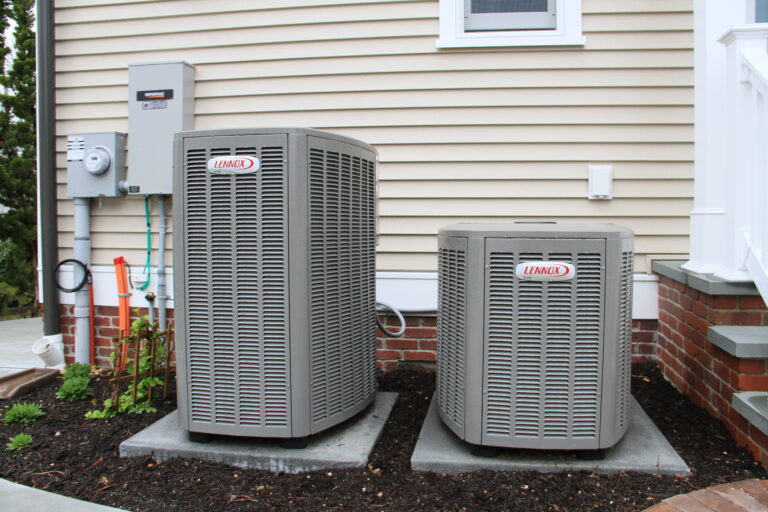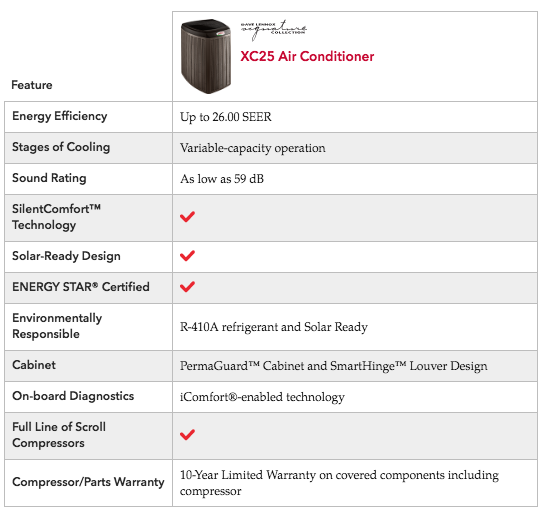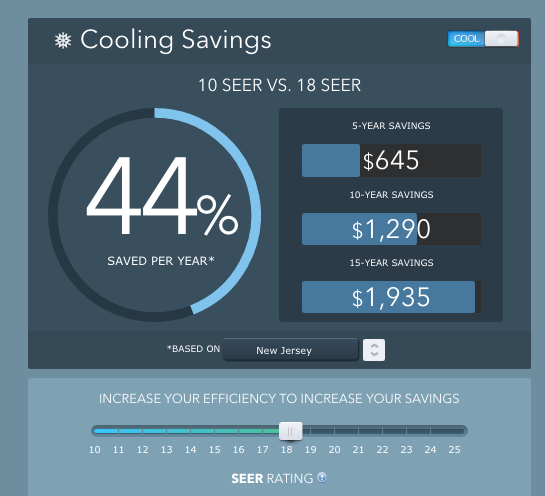How Much Does it Cost to Install an AC in NJ?
November 08, 2024

So, you wanna know how much installing an air conditioner costs?
Well, that’s kinda tough since that’s like asking “How much does a house cost?” It all depends on your family’s needs.
However, we can say that the cost to install a central air conditioner in New Jersey falls somewhere within these ranges and averages:
- Lowest to highest cost: $2,100 to $12,000+
- Most homeowners spend: $4,600 to $9,000
- Average cost: $6,800
Now, if you’re wondering, “What the heck makes those price ranges vary so much?” then read on. We’ll explain the factors that determine the cost of your installation.
Cost factor #1: Unit size
Pay attention here. This is important. If you want your AC to last at least 10 years, make sure you get the right size AC.
“Size” (measured in tons) refers to the air conditioner’s ability to remove heat from your home. The larger the size, the more heat it can remove from your home. And the more expensive it is.
However, bigger does not mean better. Finding the right size air conditioner is similar to finding the right size shoe: it can’t be too big or too small. It’s gotta be just right.
Now, here’s what happens when the AC is too small or too big:
- Too small (undersized): Runs all the time during really hot days and cannot keep you comfortable. Ends up skyrocketing your bills and dying an early death because of the constant run times.
- Too big (oversized): Cools the home too quickly, causing the AC to turn on and off too often. This “short cycling” wears down the AC’s motors (lowering its lifespan) and runs up your energy bills.
What determines what size you need? A ton of factors. A few of these factors include:
- Sq ft. of your home
- Layout of your home
- Local climate
Here’s the good news: you don’t have to figure out what size you need, a professional does. Most professional contractors offer a free in-home quote, which includes performing a load calculation. This calculation will determine the size you need.
Warning: Turn away any contractor who guesses what size you need based solely on your home’s size. This “rule of thumb” is highly inaccurate and can cause you to end up with an undersized or oversized system.
Cost factor #2: SEER (efficiency rating)
If you want lower utility bills, pay attention here. SEER stands for Seasonal Energy Efficiency Ratio and measures how efficiently the AC runs. In other words, it tells you how much money you can save on cooling bills.
SEER ratings range from 13 to 26+. The higher the rating, the more efficient—and expensive—the system.

Specs of a Lennox AC with an 26 SEER rating. Source: Lennox.com
How much will I save save with various SEER ratings?
Great question. Check out Lennox’s energy savings calculator that lets you compare ACs with different SEER ratings.
For example, here’s how much you’ll save from upgrading from a 10 SEER (an older model) to an 18 SEER model.

Keep in mind that these savings will vary based on the size of your system. To get more accurate annual savings, ask a contractor about it during the free in-home consultation.
Cost factor #3: Contractor you hire (labor cost)
Your labor cost will be a large bulk of the final price. Unfortunately, it’s hard to gauge the quality of work of a contractor until the work is actually done. So, unless you know a guy who knows a guy or your Cousin Vinny happens to be an HVAC professional, you’re left to guessing.
You can, however, make a more educated guess by doing these 3 things:
1) Look for someone with good reviews
Hop on Yelp or the BBB and find someone in your area with good reviews.
2) See if they have a professional building
You wouldn’t believe how many contractors don’t have a professional building and just work out of their truck. Why is this important? Well, let’s say someone installs your AC, but you find an issue later on. Good luck getting ahold of them.
The great thing is, you don’t have to drive to their building to see if they have one. Just look up their address on Google Maps.
3) Find someone who has been in business for at least 10 years
Imagine this: You buy a new air conditioner, but something happens that was the fault of the installers. So you contact the installer...only to find that they went out of business. That means that there’s no one who will honor the labor warranty.
Because of this type of situation, we suggest you find an HVAC company that’s been around for at least 10 years, since 96% of businesses fail within the first 10 years.
You should be able to find out how long a contractor has been in business by checking out their website.
